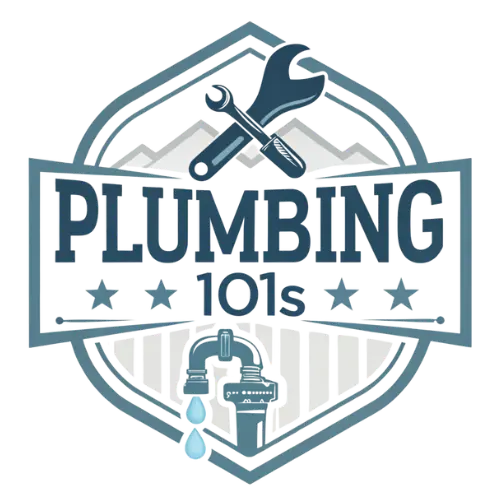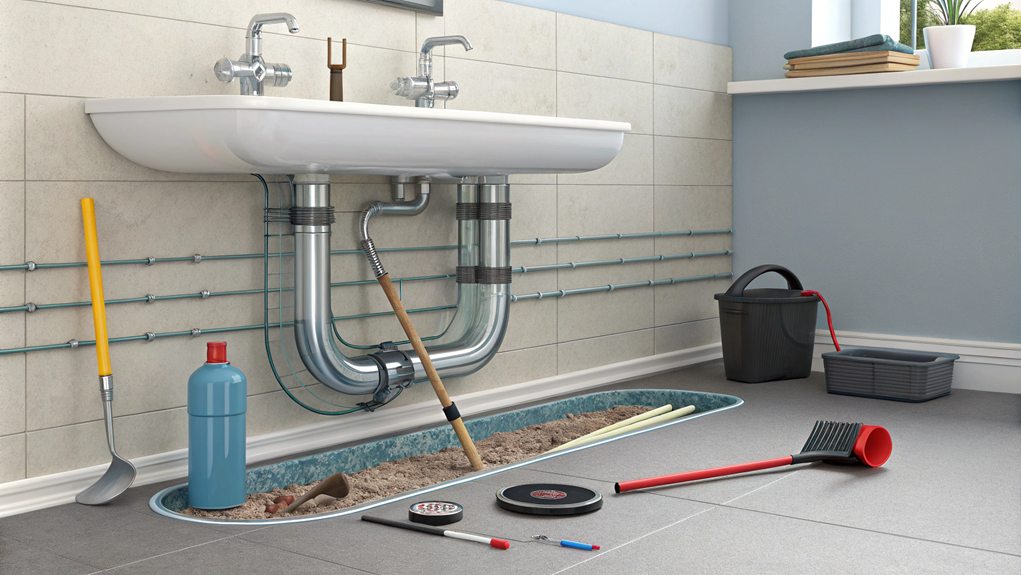Three essential tips guarantee ideal drain maintenance for a clog-free home. First, install protective barriers like sink strainers and hair catchers in all drains, cleaning them weekly to prevent debris accumulation. Second, practice mindful disposal habits by avoiding food scraps, coffee grounds, and grease in kitchen sinks, while keeping bathroom drains free from dental floss and cotton swabs. Third, implement a consistent cleaning routine that includes weekly hot water flushes and monthly baking soda-vinegar treatments to dissolve buildup. These foundational practices represent the starting point for maintaining healthy, efficient plumbing systems throughout your home.
Mindful Kitchen Sink Practices
In the kitchen, proper drain maintenance begins with mindful daily habits that prevent costly plumbing problems.
Following essential maintenance tips can greatly extend the lifespan of your plumbing system while avoiding emergency repairs caused by clogged drains.
To prevent clogs, never dispose of food scraps, coffee grounds, or eggshells down the kitchen sink. Instead, use a strainer to catch debris and regularly empty it into the trash.
Grease, fats, and oils require special attention, as they solidify in pipes and create stubborn blockages; always collect these substances in a separate container for disposal.
Regular Care Guidelines:
- Install and clean sink strainers daily
- Flush drains weekly with hot water and dish soap
- Perform monthly inspections for early signs of blockage
- Use natural cleaning solutions like baking soda and vinegar
Bathroom Drain Protection Methods
Protecting bathroom drains requires a detailed approach to prevent common problems like hair accumulation, soap scum buildup, and improper disposal practices.
Installing a hair catcher or strainer serves as the first line of defense, greatly reducing the amount of debris that enters the plumbing system.
Essential Maintenance Steps:
- Install mesh strainers or hair catchers in all bathroom drains
- Remove and clean strainers weekly to maintain ideal drainage
- Avoid disposing of dental floss, cotton swabs, or similar items in toilets or drains
- Perform monthly treatments using a natural cleaning solution of baking soda and vinegar
Preventive Measures:
- Schedule routine maintenance inspections every 6-12 months
- Address minor issues promptly before they become major blockages
- Educate all household members about proper disposal practices
- Monitor water flow regularly for early signs of developing clogs
For long-term drain health, implement a thorough maintenance schedule that includes regular cleaning, monthly treatments, and professional inspections.
This systematic approach to bathroom drain care guarantees consistent performance while minimizing the risk of unexpected plumbing needs and costly repairs.
Weekly Cleaning Routine Basics
Regular weekly cleaning routines form the cornerstone of effective drain maintenance and can prevent up to 80% of common drainage issues.
By implementing a systematic approach to drain care, homeowners can greatly reduce the likelihood of expensive repairs and inconvenient blockages.
The foundation of weekly drain maintenance begins with a thorough hot water flush, which effectively dissolves accumulated grease and soap residue.
Following this, a natural cleaning solution combining baking soda and vinegar creates a powerful reaction that breaks down stubborn deposits when left to work for 10-15 minutes.
Key Weekly Tasks:
- Pour hot water down all drains for 30 seconds
- Apply baking soda and vinegar mixture weekly
- Clean visible debris from strainers
- Remove hair and food particles, disposing in trash instead of drains
Monthly Deep-Clean Protocol:
- Use drain snake or plunger for preventive maintenance
- Inspect all drain covers and strainers
- Document any slow-draining areas
- Address minor clogs before escalation
Supporting these efforts through household education guarantees consistent implementation of proper disposal practices, creating a thorough approach to drain system protection.
Frequently Asked Questions
How to Maintain Drain Clog Free?
Implement preventive measures through regular drain cleaning, proper disposal habits, and hair traps. Avoid grease buildup, use drain covers, and schedule seasonal maintenance inspections. Practice mindful kitchen and bathroom habits for clog-free drains.
What Do Plumbers Recommend to Keep Drains Clean?
Plumbers recommend regular preventive measures including drain cleaning with professional-grade additives, installing grease traps, performing seasonal checks, and combining DIY methods with professional services every 6-12 months to prevent common blockages.
How Do You Maintain a Clogged Drain?
Regular drain cleaning with proper plumbing tools, implementing preventative measures, and scheduling professional services are essential. Address common causes through DIY solutions while maintaining consistent water flow through routine drain inspections and seasonal maintenance.
Why Should You Never Use Baking Soda and Vinegar to Unclog a Drain?
Baking soda and vinegar reactions can worsen clogs by adding residue, while their chemical reaction is too weak for effective drain cleaning. Professional advice suggests using mechanical methods or specialized products for safer, more reliable results.



